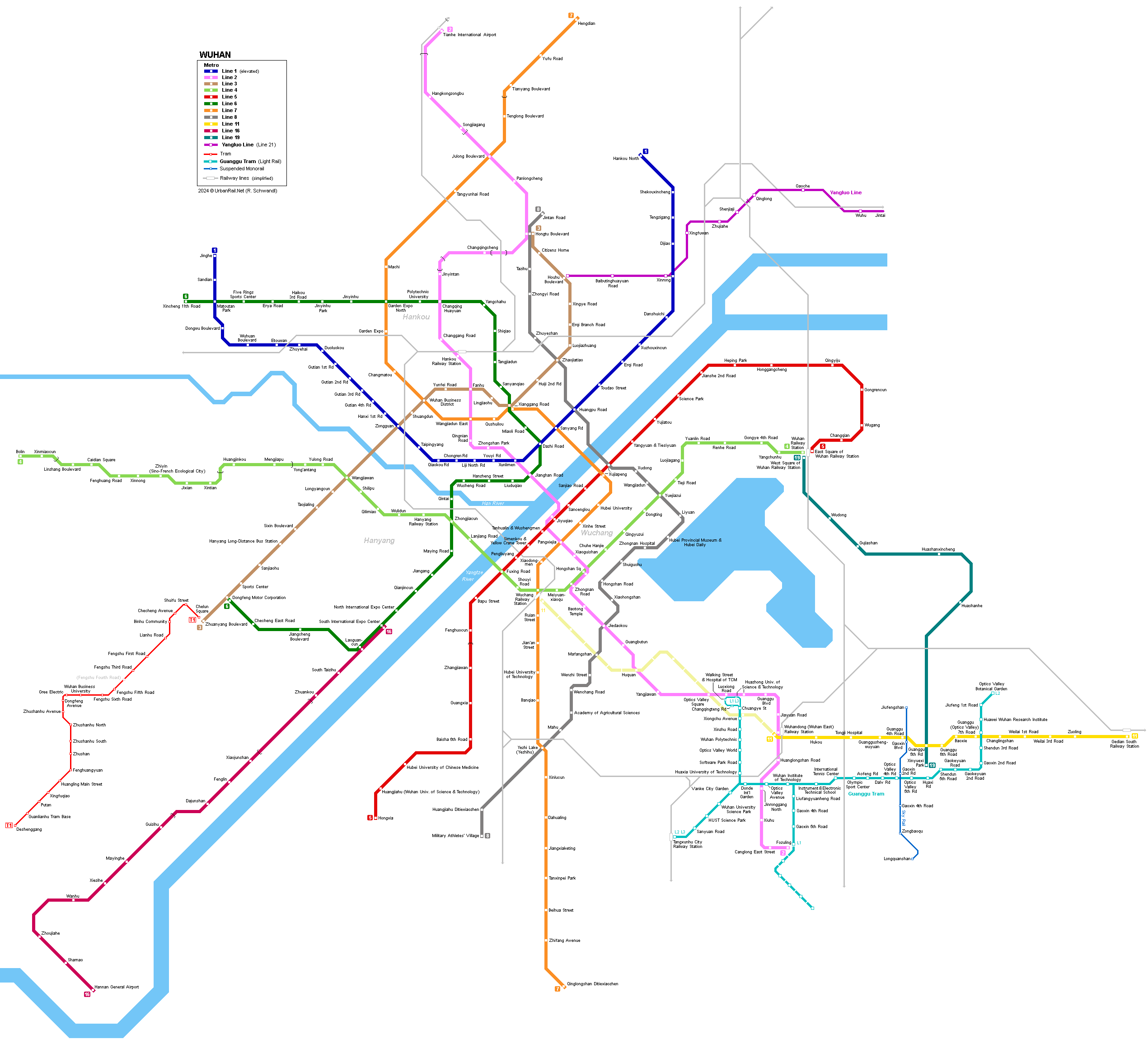
|
[ UrbanRail.Net ] [ Europe ] [ Americas ] [ Asia ] [ Africa ] [ Oceania ] [ News ] [ Books ] [ Links ] |
|
WUHAN
|
| China |

|
METRO
|
|
Wuhan, capital of Central China's Hubei Province and located by the Yangtze River, has some 11 million inhabitants. The city actually consists of three parts - Wuchang, Hankou and Hanyang - separated from each other by the Yangtze and the Han Rivers.
|
| Line 1 |
|
In September 2004, Wuhan became the fifth Chinese city with a metro (after Beijing, Tianjin, Shanghai and Guangzhou). The first 10.2 km line (10 stations) is an elevated metro. It runs from Huangpu to Zongguan in the downtown area of the Hankou District, and it is the first one in the country to use a communication-based train control system, provided by Alcatel (SelTrac® S40 CBTC). The designed minimum interval is only 90 seconds between two trains and driverless operation. As of 12/2017, Line 1 (Hankou Line) has a total length of 38.2 km and 32 stations. 28
July 2004: Zongguan - Huangpu Road (test runs) |
|
Line
2
|
|
Wuhan's second metro line runs from Hankou to Wuchang passing beneath the Yangtze River. 28 Dec 2012:
Jinyintan - Optics Valley Square (27.7 km) |
|
Line
3
|
|
Wuhan's third metro line runs from Hankou to Hanyang passing beneath the Han River (all underground): 28 Dec 2015: Hongtu Boulevard - Zhuanyang Boulevard (30.1 km)
|
|
|
|
Line
4
|
|
Wuhan's fourth metro line (actually the third to open) connects Hanyang and Wuchang Railway Stations to the new Wuhan Railway Station in the east: 28 Dec 2013:
Wuhan Railway Station - Wuchang Railway Station (17.2 km) |
|
Line
5
|
|
Running from Wuhan Railway Station south along the east bank for the Yangtse River to Hubei University of Chinese Medicine, with the southernmost section elevated; 37.2 km; 27 stations 26 Dec 2021:
Hubei University of Chinese Medicine - East Square of Wuhan Railway
Station (34.6 km)
|
|
|
|
Line
6
|
|
28 Dec 2016:
Jinyinhu Park - Dongfeng Motor Corporation (36 km)
|
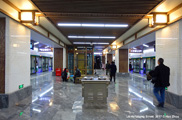
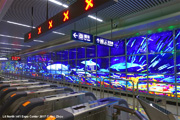

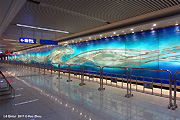
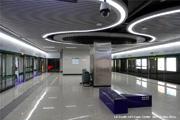
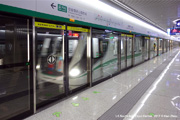 More
Line 6 photos here!
More
Line 6 photos here!
Photos © Hao Zhou & Craig Moore |
|
Line
7
|
|
01 Oct 2018:
Garden Expo North - Yezhihu (30.9 km)
|
|
Line
8
|
|
All underground north-south line linking Hankou to Wuchang passing beneath the Yangtze River: 26 Dec 2017:
Jintan Road - Liyuan (16.2 km)
|
|
Line
11
|
|
01 Oct 2018:
Wuhan East (formerly Optics Valley) Railway Station - Zuoling
(19.7
km)
|
|
More Line 11 photos here! |
|
Line
16
|
|
Suburban metro line along the west bank of the Yangtse River with some elevated sections: 26 Dec 2021:
South International Expo Center - Zhoujiahe (31.7 km)
|
|
|
|
Line
19
|
|
Tangential line through the eastern parts of the city: 30 Dec 2023: West Square of Wuhan Railway Station - Xinyuexi Park (23.3 km)
|
|
Yangluo
Line
|
|
Suburban metro line - 35 km, 16 stations; from Houhu Boulevard to Shenjiaji underground, the rest is elevated. 26 Dec 2017: Houhu Boulevard - Jintai
|
|
|
|
TRAMS
& LIGHT RAIL
|
| Auto City T1 Line |
|
Wuhan's first tram line (Auto City T1 Line) opened on 28 July 2017 in the southwest of the city as a logical extension of metro line 3. 28 July 2017: T1 Chelun Square - Deshenggang (16.8 km)
|
|
|
| Guanggu (Optics Valley) Trams |
|
With its elevated sections, including the two triangular junctions, the tram system in Guanggu (Optics Valley) southeast of Wuhan can be classified as a modern 'light rail' system. Routes L1 and L2 (with a shared 2.5 km stretch) were complemented with the regular L3 on 28 Nov. 2023. 01 April
2018: L1 Huazhong University - Fuzoling (12.5 km)
|
|
|
|
Optics
Valley Sky Rail
|
|
Suspended monorail line, running 10 km north-south through Optics Valley and primarily a tourist attraction. 26 Sept 2023: Jiufengshan – Longquanshan
|
|
|
| Links |
|
Wuhan Rail Transit (Official Website) Wuhan Metro at Wikipedia Wuhan Metro Map at Johomaps Wuhan Metro lines on Baidu Maps
|
|
Report
|
|
Some impressions sent by Craig Moore in Jan. 2017: "What I find interesting in Wuhan is that they have some appealing station architecture and ornamentation but also that they have had several unambiguous phases of Metro development with real tangible change at each stage. Line 1 is super - like Beijing Line 1 and 2 and Shanghai Line 3, it just gets on with what it is supposed to do without pretending to be anything else - rough and ready and unsophisticated. Lines 2 and 4 are of the ‘template’ phase of construction in China, such lines being common across the country and although the lines here have some redeeming features, they are pretty standard in most cases. I went on the L2 extension toward the Airport and hoped that a 5-year gap in openings would bring much difference but the stations are just newer/cleaner versions of the original provision. Line 3 opened just over a year ago and the distinctness given to individual stations is more evident but then the real leap has come in the subsequent period. Many of the lines opened across China in 2016 and now Line 6 here in Wuhan are more stylish with ornamentation at stations being quite different and it seems the designers have moved away from wanting to represent a westernised/efficient/smart style to one in which Chinese heritage is the main focus. Lots of motifs with scenes from Chinese history, lots of Chinese traditional design on platform pillars and ceilings; and also a bold use of calligraphy (which used to be played down in preference of the Latin alphabet). On the trains themselves, the use of dynamic strip maps and LCD displays is also very impressive. I really like this new confidence in their Metro design and Line 6 in Wuhan is a clear example of this change of style – some really nice stations particularly in the centre with CRRC stock and 6/7min headways. A very impressive line! Also to note that every other train heading north on Line 2 terminates at Jinyintan and headways from there to the airport (not very well patronised part of the line) is 10mins." |
|
|

2007 © Robert Schwandl (UrbanRail.Net)